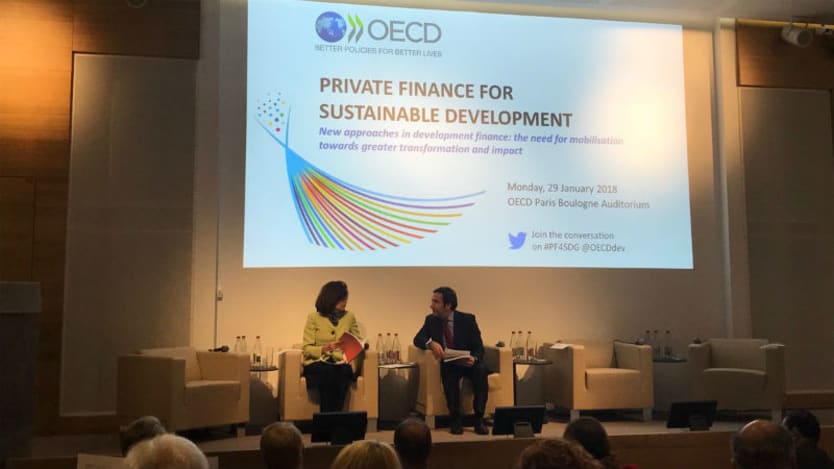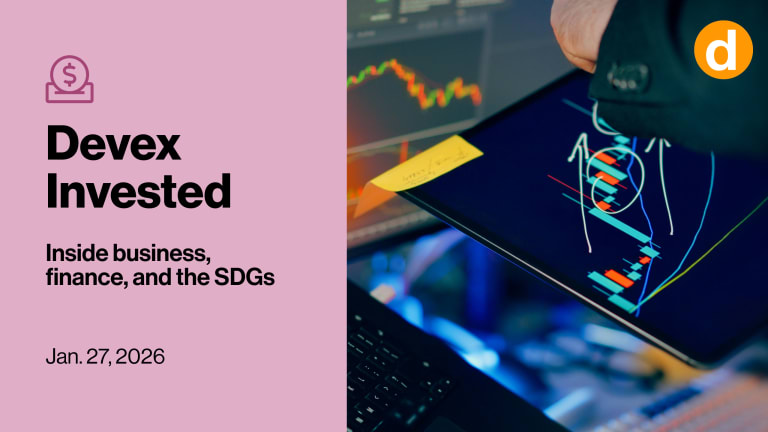
PARIS — The Organisation for Economic Co-operation and Development launched a first attempt to standardize and define the term “blended finance” at a conference in Paris, France, on Monday.
The Blended Finance Conference — attended by 150 delegates from the public, private, and philanthropic sectors — was the first of what is to be an annual event, as the development sector increasingly looks to blended finance, impact investing, and green finance as part of the solution to the $2.5 trillion shortfall to meeting the SDGs.
But representatives warned that a common framework needs to be found in order to monitor the trend more accurately.
Although development and private sector actors define the term differently, it is broadly agreed to involve the use of development finance from public or philanthropic sources to leverage private capital to support development — for example, it might include impact funds, climate bonds, loan guarantees, and political risk insurance.
Delegates at the conference rehashed the perennial challenges to blended finance instruments, namely the need to catalyze local tools despite regulatory challenges and the difficulty of finding the “missing middle,” but also attempted to get at the heart of the blended finance monolith: Agreeing on where to start.
The OECD used its five principles for blended finance — endorsed at the OECD Development Assistance Committee meeting in 2017 and presented at the World Economic Forum in Davos, Switzerland last week — as the foundation for a report on the current state of blended finance and its potential together with impact investment and green finance for bridging the $2.5 trillion funding gap toward achieving the Sustainable Development Goals.
The report found that between 2000 and 2016, donor governments set up 167 dedicated facilities that pool public finance for blending, with the number increasing each year, according to surveys conducted by the OECD and the Association of European Finance Institutions.
Jorge Moreira da Silva, director of the OECD Development Co-operation Directorate, said the OECD aims to serve as the convener and standard-bearer for the myriad players and stakeholders who hope blended finance will unlock private and philanthropic funding to supplement traditional development assistance.
See more related topics:
► The Business and Sustainable Development Commission says goodbye as it highlights blended finance
► How blended capital can help entrepreneurs make it through the missing middle
► How MIGA believes blended finance can help achieve the SDGs
“Blended finance is a good example of the added value OECD can provide. [Blended finance] was not designed by the public sector or by governments; it was a concept born from the living lab which is the world,” he told Devex. “But something was missing in terms of framework, and obviously monitoring, measurement of the impact that blended finance can provide. That’s why the OECD decided to step in first.”
He explained that the new “blended finance principles” help to fill in some of the blanks when it comes to practice. The voluntary principles stipulate that the investment must have a development-driven purpose; that it is de-risking capital that otherwise would not manifest; it should be locally driven; it must be transparent; and it must offer not only a development purpose but also a sound business model.
At the same time, members of civil society pointed to a lack of voices from the global south in the debate, and questioned the confidence behind the OECD's call for a rapid scale-up of blended finance tools.
"There is too little evidence on the positive development impacts of blended finance,” Polly Meeks, senior policy and advocacy officer at Eurodad, told Devex. “I was struck by the OECD's findings yesterday on the shortage of good [monitoring and evaluation] on blending.”
Meeks said that in her experience working in other sectors of development, she “can't imagine going to a donor with such limited evidence of impact and being told they wanted to scale up. But that's exactly what the OECD is saying about blended finance.”
An unknown quantity
Blended finance has mobilized more than $50 billion of private sector funding toward development goals over the past four years, according to a report from the Blended Finance Taskforce released during the WEF meetings in Davos. However, Moreira da Silva warned it might not be the panacea the development community is hoping for, and that evidence is still being assembled. In order to begin monitoring the impact of blended finance more fully, the development finance community must unite around a common framework, he said.
“Now that we have a definition of what is blended finance, and a set of principles, in the future we’ll be able to define the right volumes,” he said.
He added that laying down the principles will also help address concerns in the development community that an increased enthusiasm for “blending” might dilute the focus on defining and achieving impact, and that profit margins will inevitably subvert the drive for sustainability.
“I share the concern,” he said. “I worry that the focus on supply will not provide the level of impact that we’re looking for. Just monitoring the amount of finance you put on the ground doesn’t give you any sense of change.”
“In terms of impact, we must be much more focused on demand, measuring the impact of the project against the SDGs,” he said.
Meeks added that civil society in the global south would be key to understanding the impacts of blended finance, but that this perspective was missing at Monday’s event.
"The conference yesterday was dominated by voices from donor governments, development finance institutions and the private sector,” she said, but “few southern voices were at the conference, let alone among the speakers.”
Convincing the private sector
In addition — and despite the attendance of private sector representatives at the conference — Charlotte Petri Gornitzka, chair of the OECD Development Assistance Committee and former chief of the Swedish International Development Agency, said she isn’t satisfied with private sector buy-in.
“I think what we need to do is to find a broader group of the coalition of the willing in the private sector and ask them to do the agenda for us,” she told Devex.
She said we need to ask new players “to be in the driver’s seat and put the right issues on for them, though I’m not saying those are the only issues, but we need to really understand what they want to see and then take it from there,” she said.
Fresh from Davos, Petri Gornitzka said she got the sense that the international banks still aren’t seeing enough potential in development finance to really buy in, and that the onus is on the development community to make a better case.
“We need to make sure it’s worth working for, and we can do part of this on our own. There’s still something we need to do around processes, procedures, enablers, and also talking about expectations on where to invest and for what and all of that,” she said.
She said she wanted people like “the head of Citibank” to prioritize the new blended finance framework, adding: “When I’m in a room, it’s usually our community that has the invitation and when it’s not, it’s Paul Polman [CEO of Unilever].”
“It’s a problem of the usual suspects, so we need to crack that,” she said.
Update, Jan. 31, 2017:: This article has been amended to clarify that blended finance has mobilized more than $50 billion of private sector funding.
Read more Devex coverage on development finance.








